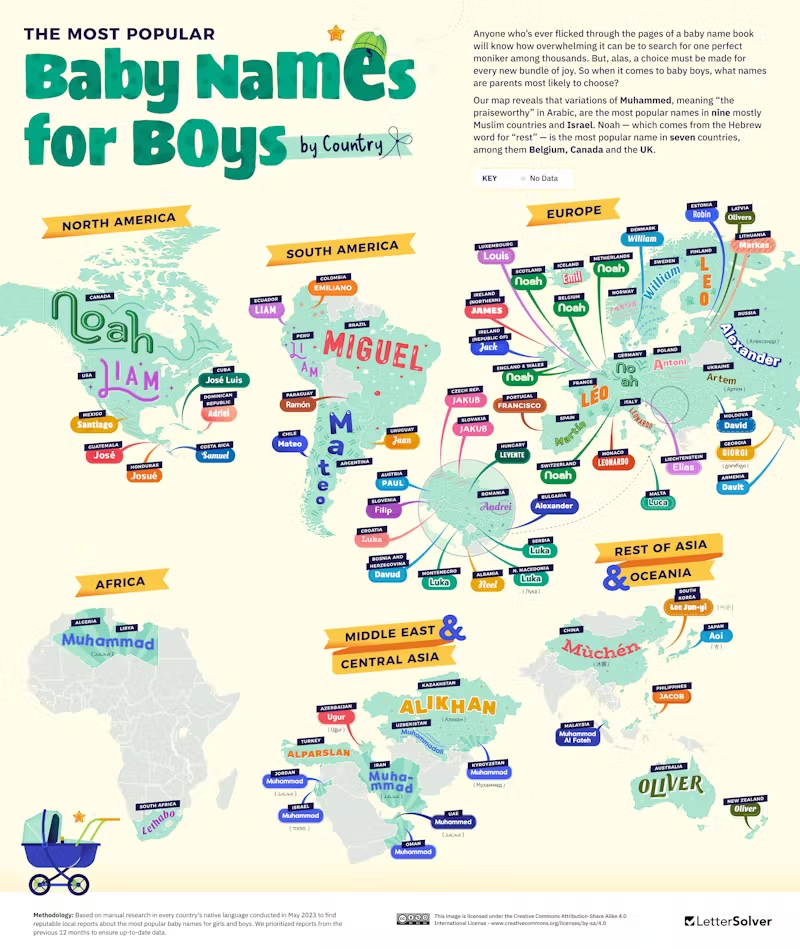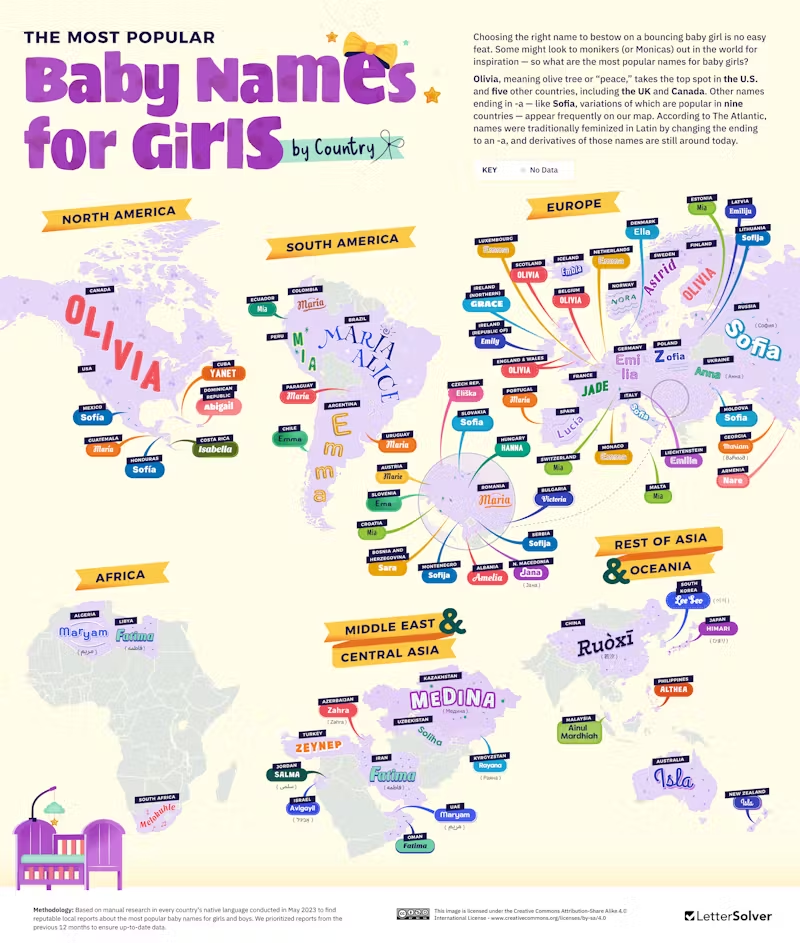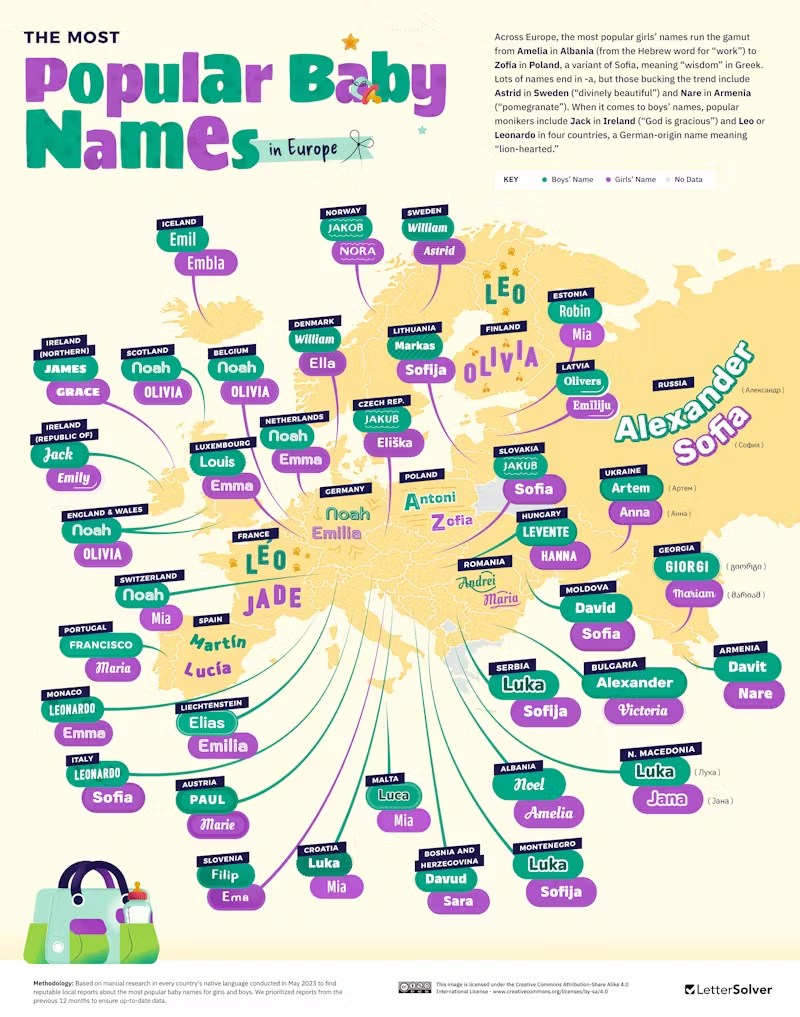The Most Popular Baby Names by Country

A baby recognizes their own name for the first time between 4-9 months. They will likely say their own name by the age of two — by which point, if you’ve used their name just 20 times a day, you’ll have said it nearly 15,000 times. (Here’s a nudge to the taciturn: “intelligence and academic success are strongly linked to the number of words a small child hears” — and don’t be afraid to use your full vocabulary; they’ll pick it up!)
By the time your child is four, they may be able to write their name. By the time they’re six, their friends will regularly be trying to make rude words out of each other’s names, and when they’re 13, they’ll contort them into supposedly cool nicknames.
Finally, when your child is 17, somebody else’s 17-year-old will have your child’s name tattooed on their skin.
So… better pick a strong one.
Letter Solver wondered just which names are the strongest right now around the world — the baby names that each country’s new arrivals have most commonly been assigned over the past year. So, we found out and created a set of lovely maps using a distinctly non-tattoo-like font for legal reasons.
What We Did
Letter Solver carried out manual research in every country’s native language to find reliable local reports about the most popular baby names for boys and girls. We prioritized reports from the past 12 months to ensure our data is up to date.
Key Findings
- Variations on the name Maria (including Mia) are the most popular in 17 countries — the most for any girls’ name.
- Variations on the name Mohammed are the most popular in ten countries — the most for any boys’ name.
- The most common names in the U.S. are Olivia and Liam.
- The most common names in England, Wales and Scotland are Olivia and Noah.
Religious-ish Names Remain Most Popular Around the World
Names with strong religious links dominate among the most popular in the world right now. Variations of Maria, Marie and Mia, all derived from the Hebrew Miryam, are the most popular names in 17 countries. (An honorable mention goes to Sofia or Sofija, top in nine countries, and known as a royal name — meaning ‘wisdom’ — rather than a religious one.)
For a boy, variations on Mohammed are top in ten countries. Noah is top in seven countries. It’s worth remembering that, in addition to being God’s chosen zookeeper and the ancestor to much of today’s global population, Noah also invented wine. In case that sways your decision.

The top boys’ name in the U.S. is Liam, a favorite shared by Peru and Ecuador. Liam comes from William, which is Ulliam in Ireland, where it was first shortened. Mass migration from Ireland in the 19th century led to the internationalization of the name, although it didn’t become a top 1,000 name in the U.S. until 1967 and did not even feature among the 100 most popular names of the past century — despite being number one for the past five years in a row.

The U.S. shares its top girls’ name, Olivia, with five countries, all in Europe. Indeed, it’s a very European name, originating from the Latin word for ‘olive tree’ and later popularized by the noble and intelligent, if impetuous, character in Shakespeare’s Twelfth Night. Its boy version, Oliver, is top in both Australia and New Zealand, which also share their top girls’ name: Isla, meaning ‘island.’
Europe: Noah for a Boy, Sofia for a Girl
Here’s a closer look at the European map. Noah is the top boys’ name in the most countries, including all of the UK except for Northern Ireland (where James wins). Luca, Lucia and Luka collectively account for the most popular boy’s name in five countries. Four of these are in the Balkan region, where it arrived from across the Adriatic in Italy. Indeed, the first Luka on record can be traced to 11th-century Croatia, where today, the Lucia version of the name — from the Latin ‘lux,’ meaning ‘light’ — is most popular. The Croatian soccer player Luka Modric may be the most famous Balkan example right now.

Sofia and Olivia dominate among girls’ names in Europe. A notable one-off is Astrid, the most popular girl’s name in Sweden. Like so many names, Astrid sets high expectations for its bearer, deriving from Old Norse words meaning ‘divinely beautiful.’ Of course, the name brings delight to many young Scandinavian children — and those much further afield — as it is perhaps best associated with the author of the Pippi Longstocking and Six Bullerby Children series, Astrid Lindgren.
Putting Rumpelstiltskin on the “Maybe” List
In addition to being less likely to be misspelled by a tattoo artist, a strong and well-known name offers other advantages. For one thing, classic names carry fewer characteristics — they hide the age and social background — which may reduce discrimination. Researchers have also shown that strangers find familiar, easily pronounceable names more likable and trustworthy. You can check our full data on the world’s most popular baby names in the table below.
On the other hand, experts say a unique name can help a child lean into its own uniqueness. “It’s a self-fulfilling prophecy that begins with an unusual name and ultimately leads to unconventional or creative thinking,” reckons Adam Alter, professor of psychology at New York University. “When you think of yourself as different, you might, in turn, think and behave differently.”
You might even consider naming your baby by imagining what the child would choose for itself when old enough: actor Jason Lee named his son Pilot Inspektor, while magician Penn Jillette called his daughter Moxie CrimeFighter. Or you could go with Liam and Olivia. They’re lovely names — the world adores them.
METHODOLOGY & SOURCES
We conducted manual research in every country’s native language to unearth local reports that revealed the most popular baby names for boys and girls.
We only include reputable reports that include analysis of baby naming trends.
We prioritized reports from the previous 12 months. If those didn't exist, we sourced the latest reports. Any omitted country indicates a lack of reputable data for recent baby naming trends in that country.
Our data is correct as of June 2023.
About the Author
Mirela Iancu is a Growth Marketer specializing in SEO, Content Strategy, and Product Marketing. A user-centered thinker, she loves numbers and data as much as words. A winning combo for SEO and word games marketing. She is also passionate about language education and the impact of tech on learning accessibility. Currently located in Barcelona, she previously founded a platform for learning Romanian online.